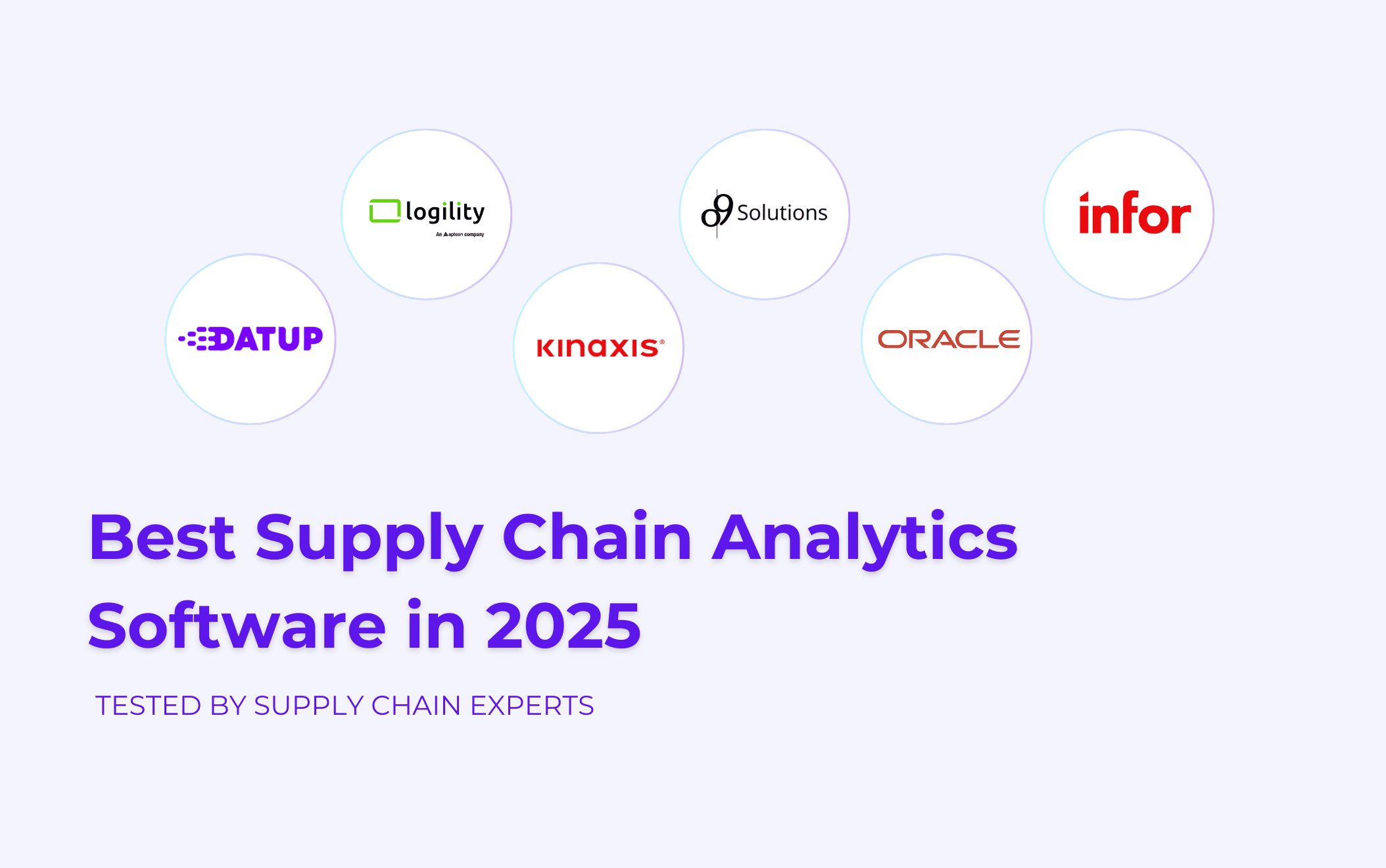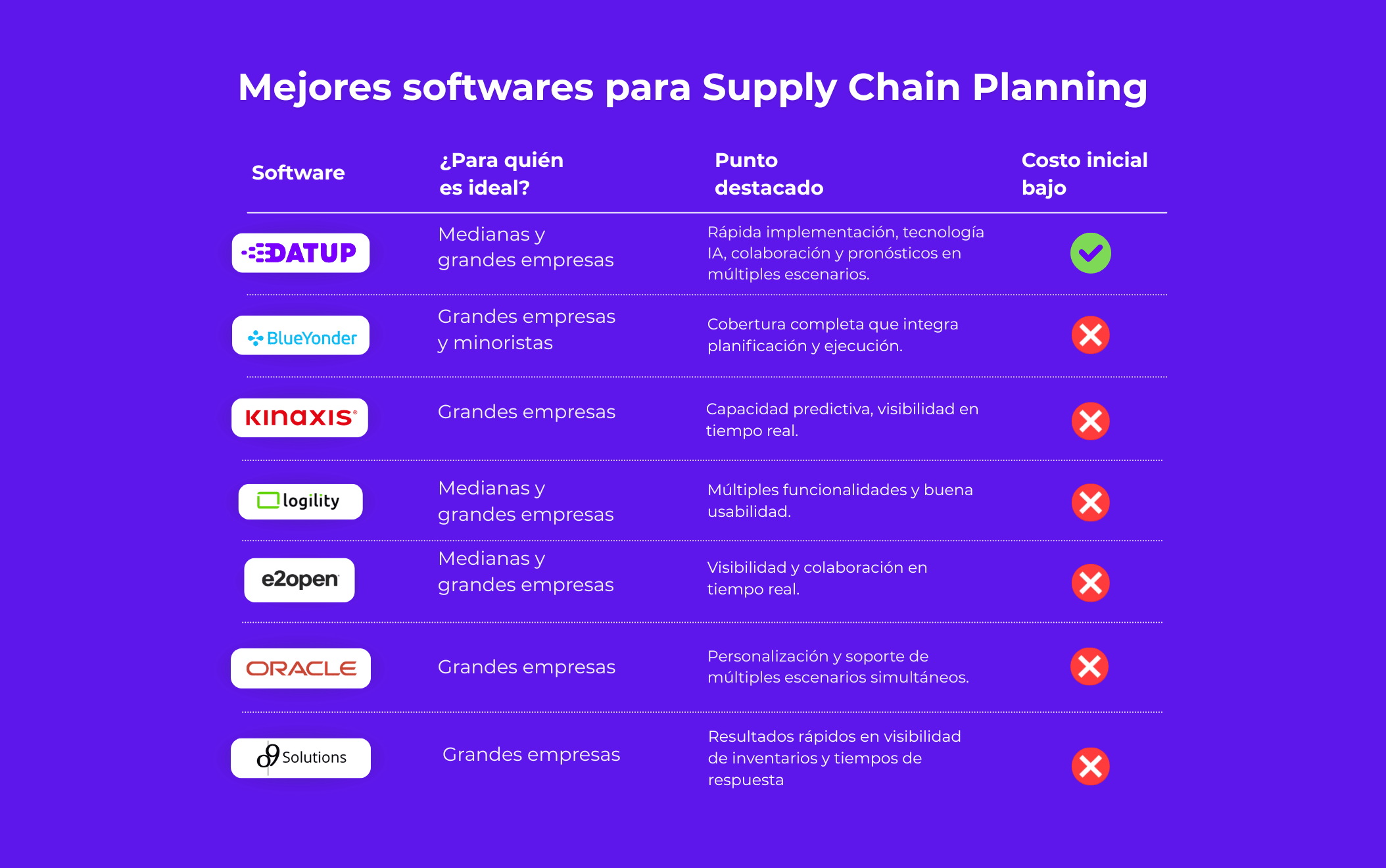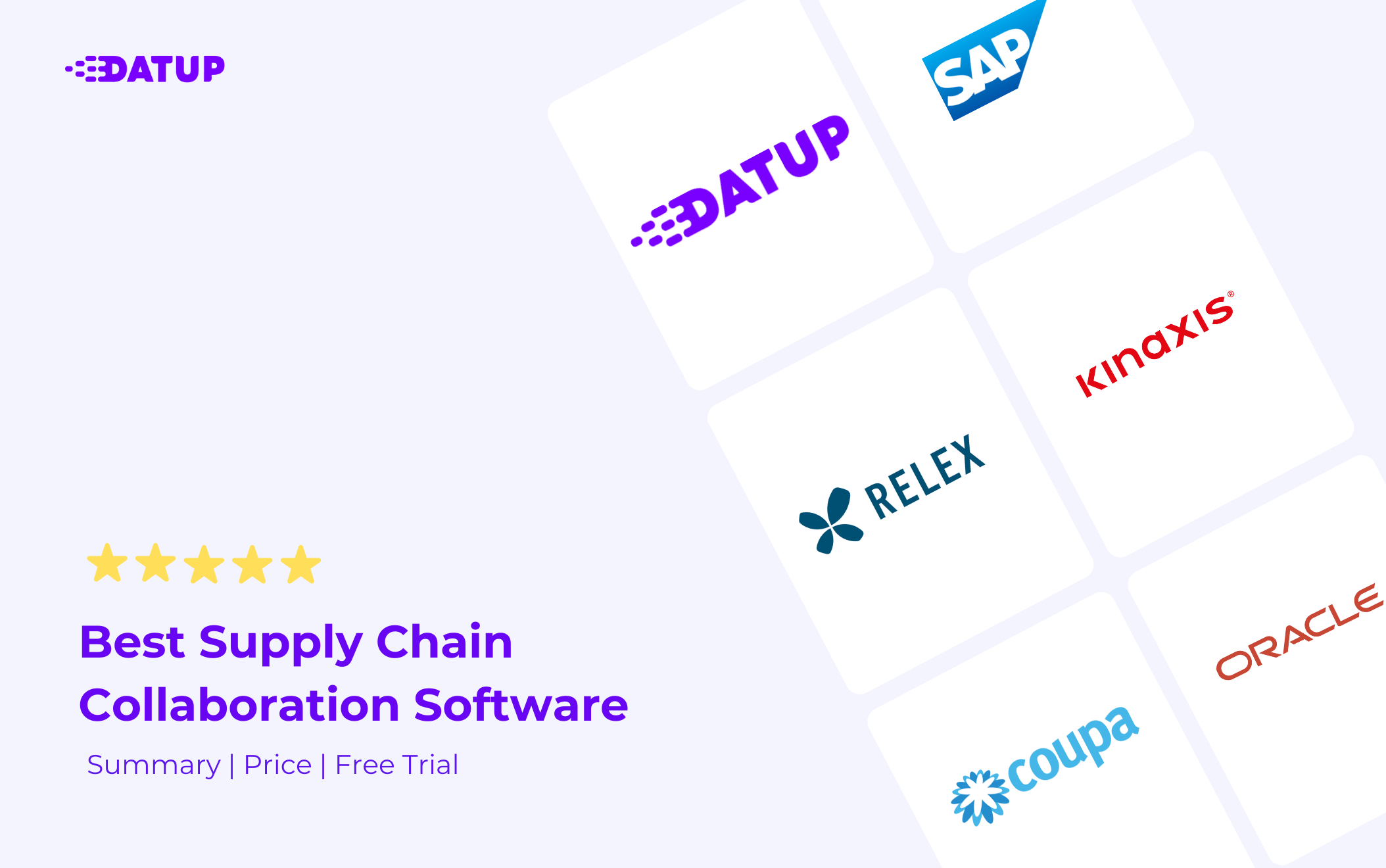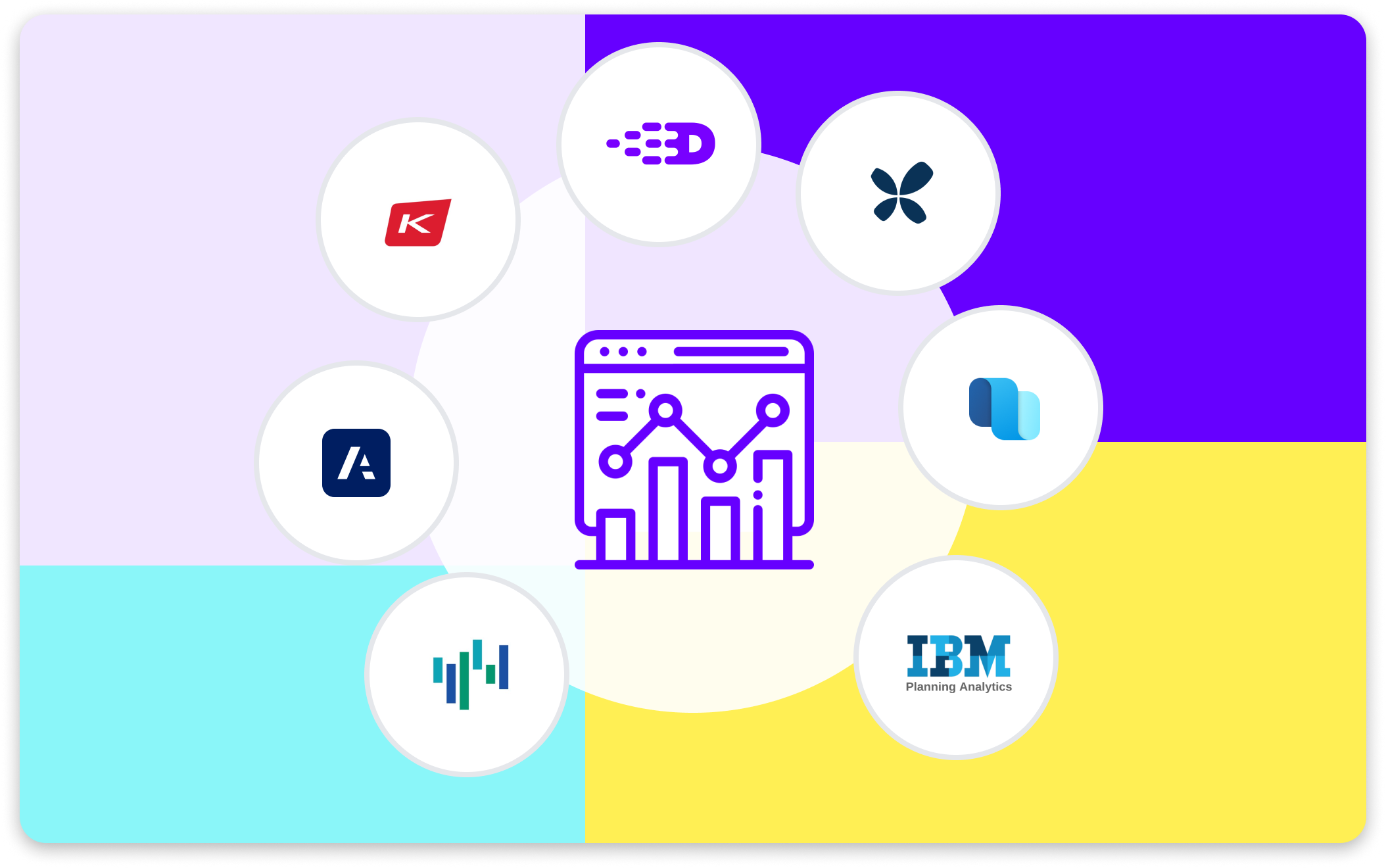Automating the supply chain is a strategic priority for many companies in 2026. When markets become more competitive, customers more demanding, and operations become global, specialized software becomes a necessity.
The supply chain automation software offering is broad, but not all are suitable for solving the same needs. Some offer ease of use and are quick to implement, while others focus on managing large-scale global operations.
Below we'll look at the best supply chain automation software available this year, delving into their functionalities, advantages, disadvantages, prices, and use cases, so you can review them and evaluate which one best fits your company's needs.
Comparison Table: Top Supply Chain Automation Software
1. Datup Supply Chain Automation Software: our choice # 1
Datup is a software focused on Supply Chain Automation optimization, which offers demand planning solutions, inventory optimization, and distribution optimization. It has automation capabilities for operational management of Supply Chain Analytics, including a personalized assistant trained for Supply Chain. This helps companies automate data operations so they can focus on strategy and other business problems.

Key Functionalities of Datup AI
Datup is a comprehensive Supply Chain automation solution, which offers different functionalities such as:
- Portfolio classification (ABC, XYZ and FSN analysis): one of the main things Datup offers is intelligent portfolio classification, which classifies your products or categories according to their impact on profitability, rotation speed and demand stability, giving more clarity on which products to pay more attention to for decision-making.
- Demand forecasting with up to 95% accuracy: automate your forecasts by SKU and SKU-location. Depending on the nature of the operation, you can obtain high accuracy with advanced artificial intelligence and machine learning models, saving operational time on spreadsheets.
- Collaborative demand planning (S&OP/S&OE): aligns different teams on a single collaborative panel, each role has access to Datup's modules, aligning all teams with a single source of information and collaboration.
- Intelligent inventory reorder optimization: Datup offers automatic inventory replenishment suggestions based on demand forecasting and business policies such as lead times and safety stock. It optimizes storage and reduces costs.
- Personalized assistant trained for Supply Chain: Datup has an AI-based assistant that helps you in your daily operations, queries and analysis, table creation or concise questions, Alaia responds to you in seconds.
- Inventory distribution optimization: Replenish locations intelligently, with Datup you can know in a few clicks where to send your inventory, facilitating multi-location availability and raising service levels.
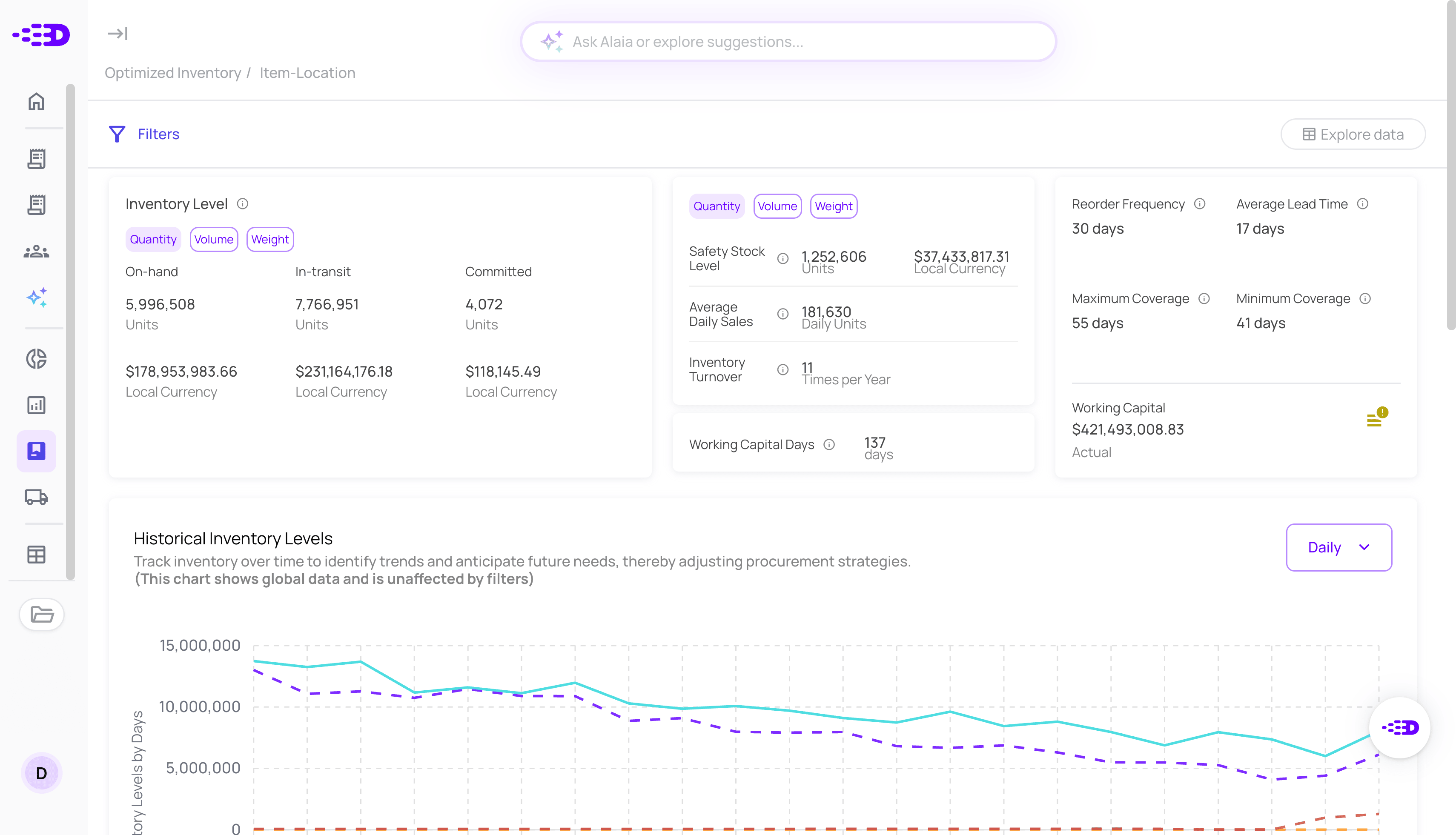
Benefits of Datup
Datup is a software as a service in constant growth, which currently has clients such as Colgate, Bimbo, Procaps, Edgewell, and continues adding major companies, among the benefits are:
- Fast implementation: its main module of portfolio classification and demand forecasting can take 5 weeks for the first results.
- Subscription pricing and unlimited users: no initial costs, billed with the first results, paid monthly without a permanence clause.
- 2.5 times less excess stock: Datup clients have presented tangible results of inventory optimization, thanks to forecast accuracy and intelligent suggestions.
- Operational hours saved: Datup clients have stated that one of their best gains has been the amount of operational hours they now delegate to the tool, having more time for other types of tasks.
What Their Clients Say:
"As a pharmaceutical company, we needed a solution that understood the complexity of our supply chain, and with Datup we found an artificial intelligence platform that, without being a custom development, adapted perfectly to our business rules."
Alejandra de Valdenebro, Corporate Supply Chain Manager, Procaps.
Disadvantages
You must have an ERP with at least 2 years of historical data to have accurate forecasts. It's a webapp, so to access it you must have internet access.
What Is the Implementation Process Like?
The process begins with the delivery of data required for the forecasting models, then the team is in charge of organizing and training the data, the first results are obtained and evaluated together with the client. Once approved, a complete delivery of the models proceeds in the Datup application for its adoption alongside the support team.
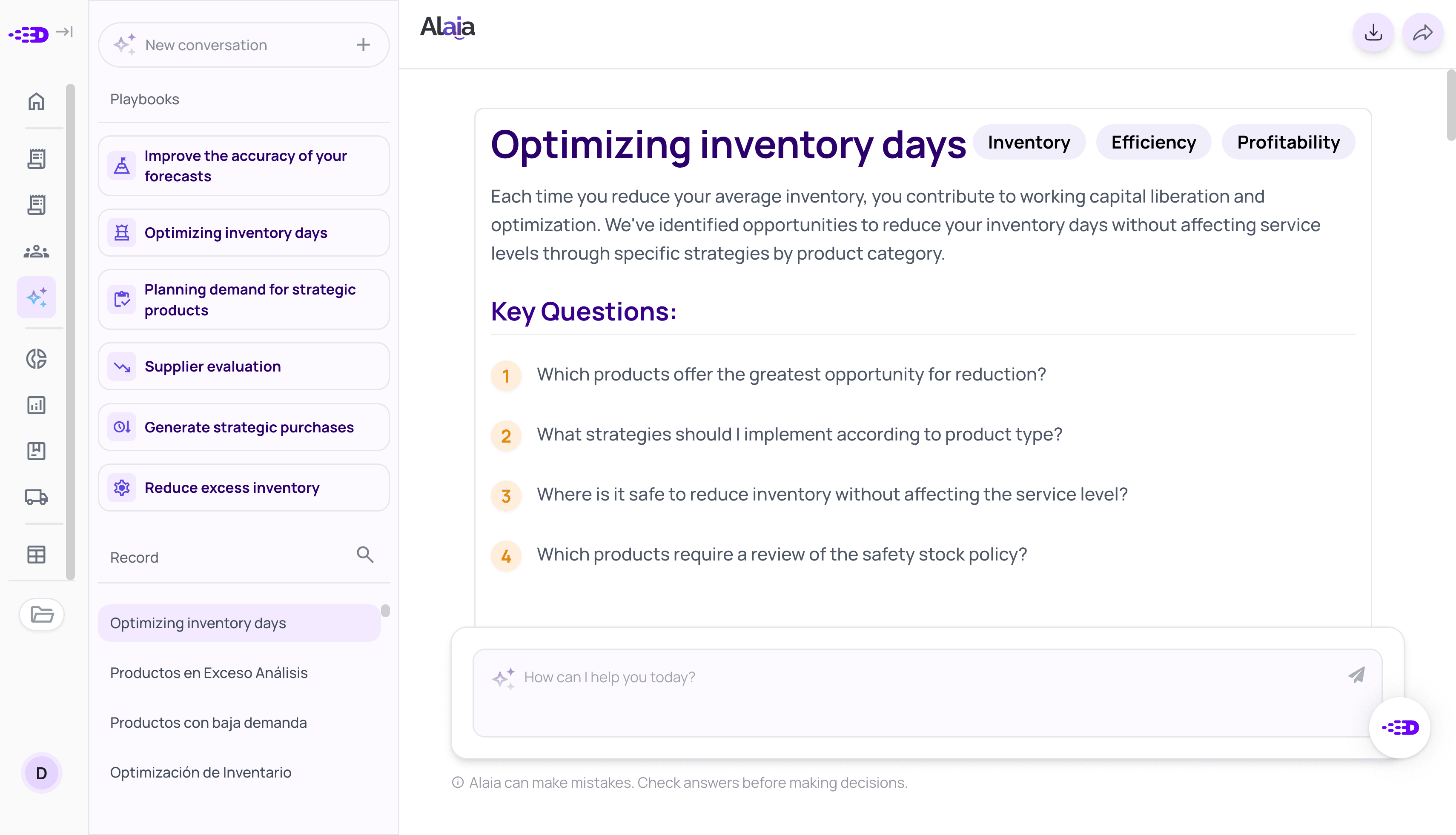
Who Is Datup Ideal For?
Datup is ideal for companies that bill more than 10M $USD per year, additionally they have an ERP with data from more than 2 years. Currently, Datup is ideal for any industry, some of which already have clients are:
Manufacturing Pharmaceuticals and laboratories Restaurant services Consumer goods Retail Hardware and construction
Pricing and Licensing Model
Datup works with a monthly subscription paid from the moment of delivery of the validated data, it has no user limit and also has no permanence clause, making it one of the fastest adoption software in the market.
2. Netstock Supply Chain Automation Software
Netstock is ideal for small and medium-sized businesses that want to improve their inventory planning process without having to make a large investment in complex systems that they don't use 100%. Its focus is on offering simplicity and speed, so that any company can perform predictive analysis without needing an IT team.

Key Functionalities of Netstock
Netstock doesn't seek to be an all-in-one solution, but to solve the essentials. That's why it offers:
- A dashboard with easily visualized critical inventory indicators.
- Predictive algorithms to forecast demand.
- Area integration to facilitate inventory planning.
- Direct integration with major ERPs.
- Netstock Academy, a training platform for users.
Advantages
Netstock has stood out in rankings like G2, with a score of 4.8/5 stars, thanks to offering measurable results in a short time. It allows:
- Reducing stockouts by up to 90%.
- Less overstock, with a 30% reduction.
- 60% less time on routine tasks, thanks to planning optimization.
- Easy access to support, which increases user satisfaction levels.
Cons
Given that its focus is on being useful and solving the essentials, with business growth some problems may appear:
- It requires manual adjustments per order.
- It doesn't offer batch automation.
- It depends heavily on the quality of historical data that's loaded.
Implementation Process
If Netstock stands out for anything, it's how quickly it's implemented. Unlike its competitors, Netstock can be operational in weeks. It has interactive onboarding and users highlight the work of the technical support team.
What Company Is It Ideal For?
Netstock is ideal for SMEs that need to improve their inventory planning. But it's also useful for:
- Companies that want to incorporate predictive analytics into their ERPs.
- Businesses looking to reduce costs and time.
Price and Licenses
Prices are customized, but what is known is that Netstock has one of the most attractive ROI-benefit ratios in the market.
Is Netstock the Software for Your Company?
If you're looking for an accessible option that offers quick results and is simple for your team, it's one of the best choices of 2026. If you have highly complex logistics processes, you may need to look at more robust options.
3. Manhattan Associates Active Supply Chain
Manhattan Associates Active Supply Chain is software designed for companies working with large-scale distribution levels, where every small error becomes significant costs and delays.
What distinguishes it from its competitors is its modern architecture, based on microservices and containers, which allows it to have flexibility and be scalable. It's a system built to grow with business needs.

Key Functionalities
Manhattan has an integrated ecosystem that incorporates different areas to cover all fronts. It offers:
- Advanced warehouse management with digital twins.
- Personnel management to increase productivity by applying game elements.
- Multimodal transportation optimization, ideal if working with diverse routes.
- Manhattan SCALE, a tool designed for extensive distribution operations.
- Mobile compatibility and support for material handling equipment.
Benefits of Manhattan Associates Supply Chain Automation
Offering a unified platform is Manhattan's main proposition. This is possible thanks to having:
- Implementation flexibility: it can be done in the cloud, locally, or hybrid.
- Cost optimization in transportation and storage.
- Operational efficiency in complex supply chains.
- Constant updates with new functions.
- Ability to grow with the company thanks to its scalability.
All this allows, for example, a retail company with multiple distribution centers to see all its inventory in real time, optimize its deliveries, and coordinate its human capital with intuitive digital tools.
Disadvantages of Manhattan Associates
The sophistication of this software makes it complex in several ways:
- Its implementation is complex, costly, and requires planning.
- It's necessary to have technical specialists who can customize its application.
- Its learning curve is considerable for new users.
Steps to Start Using Manhattan
Manhattan deploys API-first, to integrate with other systems. It also uses Kubernetes and Docker to strengthen its scaling capacity, although this means the company must have a technical team capable of taking full advantage of it.
What Companies Use Manhattan Associates for Supply Chain?
This software is clearly oriented toward large organizations, such as:
- Global companies with multiple logistics centers.
- Companies with multimodal transportation operations.
- Organizations with large-capacity warehouses.
Price
The licensing model is cloud subscription, with prices adjusted to the operation's complexity. Although there are no public figures, users report ROIs with reductions of up to 30 days of immobilized inventory.
Should You Choose Manhattan Associates Active Supply Chain?
This option isn't for everyone. But if your company has extensive supply chains, with multiple warehouses and advanced transportation needs, Manhattan offers the ideal scale and technological modernity to power it.
4. Oracle Supply Chain Automation
Oracle SCM Cloud is the ideal software when it comes to large-scale automation. This software doesn't focus on a specific aspect of the supply chain, but rather builds a complete ecosystem that manages to integrate from demand planning to order closure, in addition to managing the product lifecycle. And it does all this cloud-based. End-to-end visibility and control are Oracle's objectives.

What Characteristics Does Oracle Have for Supply Chain Automation?
This software has a set of characteristics that make it stand out. It allows:
- Comprehensively planning the supply chain.
- Forecasting demand and inventory using predictive algorithms.
- Scheduling production with flexibility, to adapt to available capacity.
- Managing the product lifecycle, from design to distribution.
- Accessing remotely and in real time all process instances, thanks to having everything hosted in the cloud.
Benefits of Oracle
The main benefits that Oracle SCM Cloud offers are related to its objective: its breadth and scalability:
- It's a platform that can grow together with the company until managing global chains.
- It integrates completely with any Oracle product, it's ideal for those already using its services.
- It has great analytical capabilities which allows making data-based decisions.
- It stays at the technological forefront with its continuous updates.
Oracle allows managing the entire supply chain, from anywhere in the world, making it possible to respond quickly to changes in demand at any time and from anywhere.
Limitations of Oracle for Supply Chain Automation
This capacity and complexity also implies dealing with certain challenges, such as:
- High costs, in licensing and for implementation.
- Steep learning curve.
- Onboardings of up to a year.
Implementation Process
Implementation can take between 6 and 18 months, depending on the company's needs. It's a process that requires planning, resources, and patience, in exchange for consolidating an extremely complete platform.
Uses in Different Industries
Oracle SCM is software chosen in industries where planning and global coordination are key. For example:
- It's chosen by multinational companies that operate on more than one continent.
- Manufacturing industries with complex production processes.
- Consolidated organizations that already work with other Oracle products.
How Much Does Oracle Cost?
Prices are not public, so its costs are customized and vary according to the modules implemented and company size. Within its set of competitors, it's one of the most expensive options.
Is Oracle for Your Company?
If your company needs advanced planning, scalability, or integration with Oracle, this is one of the best alternatives in the market.
5. SAP Supply Chain Automation
SAP is one of the most recognized supply chain automation platforms in the market, and best supported by its track record. Designed for large companies, SAP SCM offers an ecosystem that connects inventories, planning, logistics, and suppliers in one place.
Its main objective is to offer total supply chain control, ideal for those seeking to standardize processes in different countries or regions.

Main Functionalities
SAP is not lightweight software, but rather consists of a set of modules that integrate with each other to offer:
- Advanced planning, through its optimization scenarios.
- Real-time visibility of inventories and movements.
- Integration with other SAP ERP systems.
- Capabilities to coordinate international operations.
- Scalability, adapting to each company's growth.
Benefits
Among the benefits it offers, its users highlight that:
- It offers greater productivity when dealing with complex processes.
- It reduces operational costs because it centralizes information.
- It's reliable for conducting high-volume international operations.
- It continuously innovates in its artificial intelligence functions.
SAP is a competitive advantage for companies that must manage global networks.
Limitations
Its great capacity brings some important challenges for its users.
- It's very complex, so it's necessary to have certified consultants and specialists.
- It has a steep learning curve for new users.
- High initial investment, due to implementation costs.
- 3 to 12 months are needed to implement it.
Implementation Process
Its implementation involves exhaustive planning, which can be done modularly or completely, but always involves a long process, with ERP integration and specialized consulting. To be able to implement it effectively, it's necessary to have time and patience.
For What Companies Is It Best to Use SAP?
The companies that can make the most of this software are:
- Large manufacturing companies with complex chains.
- Organizations that already work with other SAP systems.
- Multinationals with multiple subsidiaries.
Costs and Plans
SAP SCM has annual licenses, and its price depends on the number of users involved and modules activated:
- Its license range goes from $25,000 to more than $300,000 annually.
- Its implementation alone can cost between $50,000 and $500,000 additional.
Is SAP the Ideal Supply Chain Automation Software for Your Company?
If your company seeks scalability and reliability, and also has resources to face the initial investment, yes. For companies with limited budgets it can be costly and complex.
6. E2open
E2open functions as a global collaborative network, as it connects companies with a community of more than 400,000 trading partners, becoming a bridge between manufacturers, suppliers, distributors, and customers.
Its proposition is to provide real-time visibility and foster collaboration between the parties involved to reduce friction between the chain links and accelerate processes.}

Highlighted Aspects of E2open
What makes E2open a unique option is its ability to integrate quickly and extend to an entire network of operations. Some of its highlighted aspects that enable this are:
- Its cloud-native SaaS model, allows accessing at any time and from anywhere any instance of the chain.
- Pre-built ERP connectors and easily integrated scalable APIs.
- Supply chain automation.
- Its global trade tools, designed to comply with international regulations.
- Collaborative analysis, which includes post-execution evaluations.
Benefits of E2open for Supply Chain Automation
These aspects allow obtaining some benefits such as:
- End-to-end visibility.
- Rapid implementation.
- Constant availability of updates that don't need reimplementations.
- Decreasing need to perform manual tasks, due to automation of repetitive processes.
- It improves coordination among those involved in the chain.
In addition to optimizing internal operations, E2open connects companies with a global ecosystem of partners.
Cons of E2open
This model, with all its strengths, also presents some weaknesses that must be taken into account:
- Increasingly high costs as you advance with modules.
- Complex interface for new users.
- Updates can be unstable.
- Its artificial intelligence capabilities are not clear.
How to Start Using E2open
E2open offers a SaaS approach with pre-built connectors that enable rapid implementation. However, customizing it requires technical resources and specialized consulting.
What Type of Companies Use E2open?
This is software designed for companies with international reach:
- Multinational corporations with global operations.
- Companies with multichannel sales and distribution processes.
- Organizations that must comply with international parameters.
Prices and Licenses
As with several of its competitors, E2open's costs vary according to company size and the modules contracted.
Is E2open the Supply Chain Automation Tool for Your Business?
E2open is ideal for companies that need global connection and collaboration. Its proposition is optimal for corporations with multiple partners and international operations. For SMEs it can be an excessively complex and costly option.
Benefits of a Supply Chain Automation Software
Adopting a supply chain automation software means transforming the way your company operates and responds to the market. The benefits that this incorporation can bring to a company include:
- Reduction of operational costs: having supply chain automation software facilitates this by optimizing inventories and transportation.
- Real-time visibility: to anticipate problems and make faster decisions.
- Reducing human errors: by reducing manual processes, failures are reduced with them.
- Increasing resilience: facing changes in demand or external disruptions, the company can adapt better if it has supply chain automation software.
- Improvements in collaboration: by working in the same environment, suppliers, distributors, and customers handle the same information.
These benefits become advantages over those who don't get ahead of the challenges of a world full of uncertainty.
Functionalities of a Supply Chain Automation Software
Each of the mentioned platforms has its own approach and objectives. But most of them include functionalities that are already considered standard:
- Demand forecasting with predictive algorithms.
- Advanced inventory and warehouse management with clear dashboards.
- Integration with ERP to consolidate data.
- Multimodal transportation and logistics control.
- Real-time reports and analytics, to facilitate decision-making.
The differences between platforms can occur in the level of sophistication, intentionality, more or less specialized modules, the level of global operation or not, costs, etc.
Frequently Asked Questions
How do I start automating my supply chain?
First, it's important to identify the areas that need improvement (unbalanced inventories, excess stock, logistics delays). Then look for software that is compatible with your ERP and that is useful for solving those priority needs.
How does supply chain automation work?
It works by connecting inventory, logistics, supplier, and sales data on a single platform. From there, predictive algorithms and automatic flows help to plan better and execute with fewer errors.
Why is supply chain automation important?
Because it allows operating with greater agility, reducing costs, anticipating stock breaks, and adapting to demand in real time, something critical in global and changing markets.
What is supply chain automation software?
It's the use of specialized software that applies artificial intelligence, predictive analytics, and online collaboration to manage inventories, production, transportation, and suppliers in an integrated way.

![Best Supply Chain Automation Software in 2026 [Updated]](https://cdn.prod.website-files.com/67aa77fdde6ccbbc569579f4/6909161d31ad611a3dadf779_top-supply-chain-automation-software.png)


%20Software%20for%202025%20(3).png)
